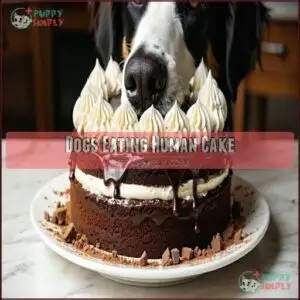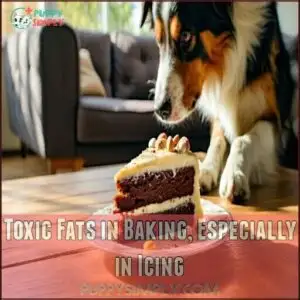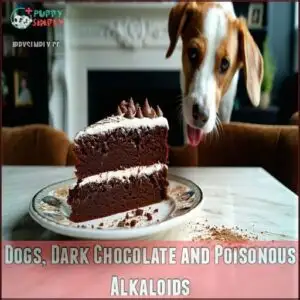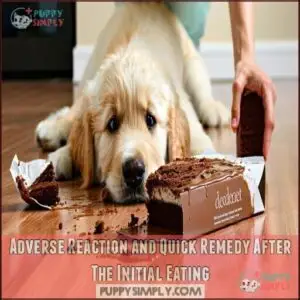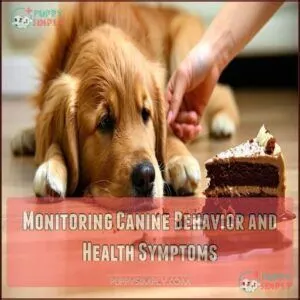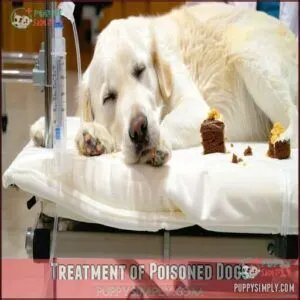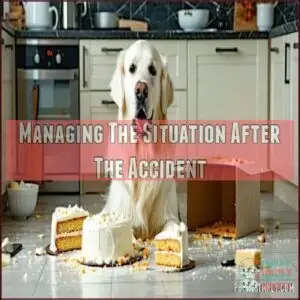This site is supported by our readers. We may earn a commission, at no cost to you, if you purchase through links.

While those puppy-dog eyes might be hard to resist, most cakes contain ingredients that can harm your furry friend.
Sugar can lead to obesity and dental issues, while common cake ingredients like chocolate, xylitol, and raisins are toxic to dogs.
Even "plain" cake has too much fat and sugar for your pup’s digestive system.
That birthday party moment when your dog snags a bite might seem cute, but it’s playing with fire.
If you want to celebrate with your canine companion, there are specially formulated dog-friendly treats that won’t send you racing to the emergency vet.
Table Of Contents
Key Takeaways
- You shouldn’t feed your dog cake as it contains harmful ingredients like chocolate, xylitol, and excessive sugar that can cause serious health issues ranging from upset stomachs to life-threatening conditions.
- If your dog eats cake, you’ll need to act quickly – contact your vet immediately, don’t induce vomiting without professional guidance, and monitor for symptoms like restlessness, vomiting, or elevated heart rate.
- You can treat your dog to specially made dog-friendly cakes using safe ingredients like pumpkin, peanut butter, and whole wheat flour instead of risking their health with human cake.
- Regular cake consumption can lead to obesity in dogs, which puts stress on joints, increases risks of heart disease and diabetes, and can shorten your dog’s lifespan by 2-3 years, resulting in serious health issues.
Dogs Eating Human Cake
You’ll want to think twice before sharing your birthday cake with Fido, as most human cakes contain ingredients like chocolate, xylitol, and high amounts of sugar that can be toxic to dogs.
Even small amounts can cause upset stomachs, while larger portions might lead to serious health issues like poisoning or obesity that could have your furry friend making an unexpected trip to the vet.
Why Cake is Toxic to Dogs
That slice of birthday cake might seem harmless, but it’s a potential poison bomb for your four-legged friend.
Human cake contains toxic ingredients that can wreak havoc on your dog’s system.
Chocolate, xylitol (a common sugar substitute), and high sugar content are particularly dangerous, causing everything from upset stomachs to life-threatening conditions.
Even without these specific toxins, cake’s rich ingredients can trigger allergies and disrupt your pup’s delicate canine nutrition balance.
It’s vital to understand dog cake risks to keep your pet safe, and be aware of the life-threatening conditions that can occur.
Ingredients That Pose Health Risks to Dogs
Several cake ingredients lurk as hidden dangers for your furry friend.
Toxic ingredients like chocolate contain theobromine that can damage your dog’s heart and nervous system. Xylitol, found in sugar-free treats, can trigger seizures or liver failure.
Raisins, macadamia nuts, and nutmeg are equally harmful. Even high sugar content can wreak havoc on your pup’s digestive system.
Always check cake ingredients before sharing, as these toxic ingredients can have severe consequences.
Obesity and Weight Management for Dogs
While harmful ingredients pose their own risks, cake’s sugar content presents another serious concern – weight gain and obesity in dogs.
Regular cake consumption can quickly lead to dog obesity, which brings numerous health complications.
- Extra pounds put stress on joints, leading to arthritis and mobility issues
- Excess weight increases risks of heart disease and diabetes
- Obese dogs typically live 2-3 years less than their healthy-weight counterparts
Dog nutrition experts recommend treats comprise only 5-10% of your pet’s daily calories, to prevent obesity.
Identifying Poisonous Ingredients
You’ll need to spot harmful cake ingredients like chocolate, xylitol, and macadamia nuts that can send your furry friend straight to the emergency vet.
When your dog gives you those pleading puppy eyes during dessert time, remember that knowing these toxic ingredients might just save their life.
Toxic Fats in Baking, Especially in Icing
Moving from general cake dangers, let’s examine what makes icing particularly problematic for your furry friend.
Those beautiful cake decorations contain concentrated toxic ingredients your dog’s system can’t handle.
Fatty acids in baking oils and butter create icing that’s hard for dogs to digest, potentially causing pancreatitis. Sugar substitutes like xylitol are even more dangerous—just a tiny amount can be lethal.
Always keep cake fats and sugary decorations away from curious paws.
Dogs, Dark Chocolate and Poisonous Alkaloids
While cake with any chocolate poses risks, dark chocolate contains higher concentrations of theobromine and caffeine – alkaloids extremely toxic to dogs.
Your pup’s body can’t process these compounds like humans can. Even small amounts of dark chocolate can cause serious canine health problems, including racing heart, seizures, and potentially death.
Other chocolate toxicity symptoms include vomiting, diarrhea, increased body temperature, and muscle rigidity.
Remember: the darker the chocolate, the more dangerous it’s for your dog’s safety.
Adverse Reaction and Quick Remedy After The Initial Eating
After your dog consumes chocolate cake, you’ll need to act fast.
Symptoms of chocolate toxicity typically appear within 2-4 hours.
Here’s your first aid action plan:
- Contact your vet or Animal Poison Control Center immediately
- Don’t induce vomiting without professional guidance
- Keep packaging to identify ingredients
- Monitor for symptoms like restlessness, vomiting, or elevated heart rate
- Activated charcoal may be recommended for poisoning cases
Dog-Friendly Alternatives to Human Cake
You can treat your furry friend to special dog-friendly cakes made with safe ingredients like pumpkin, peanut butter, and whole wheat flour instead of risking their health with human cake.
You’ll find peace of mind knowing these tasty alternatives satisfy your dog’s sweet tooth without exposing them to harmful toxins found in regular cake, which can be a sweet tooth solution.
Dog Cakes Made With Safe Ingredients
Pet-friendly celebrations don’t require risky human treats. Safe ingredient cakes for dogs include pumpkin, peanut butter, and banana options that won’t harm your furry friend.
Many pet bakeries now offer specialized dog-friendly cakes made without toxic ingredients. When selecting or making dog cake recipes, focus on nutritional benefits rather than sweet flavors.
Remember, what’s delicious for humans isn’t always safe for your four-legged companion. For a dog’s special day, consider using dog cake products to guarantee a safe and enjoyable treat.
Baking Dog Cakes at Home
After learning about store-bought options, why not try your hand at baking dog-friendly cakes at home? It’s easier than you think!
Choose simple canine cake recipes using:
- Pumpkin puree (not pie filling)
- Natural peanut butter (xylitol-free)
- Whole wheat or oat flour
- Plain yogurt for "frosting"
Your pup will love these homemade treats, and you’ll know exactly what’s in their special dogfriendly cake! When considering dog treats, be aware of toxic food risks to guarantee their safety.
Indications of Dog Cake Poisoning
You’ll notice something’s wrong with your dog after eating cake when they start vomiting, experiencing diarrhea, or showing unusual lethargy within hours of consumption.
If your furry friend consumed chocolate cake or anything with xylitol, don’t wait for symptoms to appear—these ingredients can be life-threatening and require immediate veterinary attention.
Monitoring Canine Behavior and Health Symptoms
After discovering your furry friend devoured cake, watch closely for these warning signs:
Appetite changes and digestive upset like vomiting or diarrhea are primary indicators of potential poisoning.
Look for behavioral shifts – unusual lethargy/fatigue or excessive restlessness. Monitor for respiratory distress, excessive drooling, or trembling, which could signal a reaction to toxic ingredients.
It’s vital to recognize sick dog symptoms to provide timely care. Remember, symptoms can appear within 30 minutes to several hours after consumption, depending on the health risks involved, and it’s crucial to be aware of potential poisoning.
Treatment of Poisoned Dogs
After spotting toxicity symptoms in your dog from cake consumption, immediate action is critical.
Call a pet poison hotline or veterinarian right away—timing matters with toxicosis.
Emergency care might include induced vomiting or activated charcoal for certain toxic ingredients. Your vet may administer IV fluids, medications, or monitoring.
With prompt intervention, many dogs make a full recovery from cake-related poisoning. Never wait to seek veterinary care.
Preventing Future Cases, Supervise Snacking Between Kids to Pets
The key to accident prevention lies in vigilant supervision of kid-pet interactions.
Teach children never to share human food with dogs, especially cakes containing chocolate or xylitol which are dangerous for dogs.
Create a "pet snack safety" zone with healthy treat options that are safe for dogs.
When hosting gatherings, designate a responsible adult to monitor all supervised feeding, preventing potential health risks for dogs.
Managing The Situation After The Accident
If you’ve caught your dog eating cake, don’t panic—quick action can make all the difference between a minor scare and an emergency trip to the vet.
You’ll need to contact your veterinarian immediately if your dog has consumed cake containing toxic ingredients like chocolate, raisins, or xylitol, as these require professional intervention.
Veterinary Intervention Necessary
When symptoms of cake poisoning appear in your dog, veterinary help isn’t optional—it’s critical.
After monitoring symptoms from chocolate or other toxic cake ingredients, you’ll need immediate professional intervention. Regular dog wellness checkups are vital for preventative care.
Your vet might implement:
- Induced vomiting to remove toxins
- Activated charcoal treatments to absorb poisons
- IV fluids for supportive care
Call the Poison Control hotline (888-426-4435) while heading to your emergency vet visit.
Post-treatment monitoring will guarantee your pup recovers fully.
Handling Stressful Reactions After an Intoxicating Piece
Now that your dog’s in veterinary hands, focus on managing their anxiety after consuming toxic cake ingredients. Dogs often display stress after chocolate or other harmful substances.
Your calm presence matters. Use gentle petting and a soft, reassuring voice to provide emotional support.
| Stress Signal | Anxiety Reduction | Post-Incident Care |
|---|---|---|
| Panting | Slow strokes | Quiet environment |
| Trembling | Familiar blanket | Limited movement |
| Whining | Soft talking | Hydration access |
Remember, dogs can’t process cake safety concerns like we can. Your reassurance is their anchor during recovery.
Immediate Response and Treatment
A panicked pet parent needs to act swiftly when Fido devours cake. Call your vet or Pet Poison Control immediately (1-888-426-4435) for guidance on next steps.
- Watch for toxicity signs like vomiting, lethargy, or agitation
- Keep poison control numbers saved in your phone
- Never induce vomiting without veterinary guidance
- Bring packaging of any cake ingredients if heading to emergency care
Maintaining Good Dog Health Overall
Now that you’ve handled any cake-related emergencies, let’s focus on maintaining your dog’s overall health for the long run.
Just as we need proper care to thrive, your canine companion requires attention to specific aspects of their wellness routine:
- Balanced Dog Nutrition: Feed high-quality dog food appropriate for your pet’s age, size, and activity level.
- Regular Exercise Regimen: Whether it’s a daily walk or backyard play session, physical activity keeps your pup’s weight in check and stimulates their mind.
- Preventative Veterinary Care: Schedule check-ups at least annually.
Your vet can catch potential health issues before they become serious problems.
Think of it as an investment in years of tail-wagging happiness!
Maintaining peak health involves understanding canine health basics to guarantee your dog lives a long and healthy life.
Remember that 90% of your dog’s health begins in their digestive system!
You’ll be amazed how a tired dog is almost always a well-behaved dog!
Frequently Asked Questions (FAQs)
Can I give my dog cake?
No, you shouldn’t give your dog cake.
Most cakes contain ingredients toxic to dogs like chocolate, xylitol, or high sugar content.
Try dog-friendly alternatives instead – your pup’s health will thank you!
Can puppies eat cake?
Would you willingly give your child candy with potentially toxic ingredients?
Puppies shouldn’t eat cake because it contains harmful ingredients like sugar, chocolate, and xylitol that can cause serious health issues.
Try dog-friendly treats instead.
Can dogs eat chocolate cake?
No, dogs should never eat chocolate cake.
Chocolate contains theobromine, which is toxic to dogs and can cause serious health issues including seizures, heart problems, and even death.
It’s absolutely off-limits.
Can dogs eat pound cake?
Your furry friend shouldn’t indulge in pound cake.
Though less dangerous than chocolate varieties, it’s still packed with sugar and fats that aren’t good for your pup’s health.
Better to choose dog-specific treats instead.
Can dogs eat cake icing?
No, you shouldn’t feed your dog cake icing.
It’s loaded with sugar that can cause obesity and dental problems.
Many icings also contain xylitol or chocolate, which are toxic to your furry friend.
Can dogs eat sugar free cake?
Like a wolf in sheep’s clothing, sugar-free cake often contains xylitol, which is extremely toxic to your dog.
Even small amounts can cause seizures, liver failure, or death.
Avoid it completely.
What kind of cake can dogs eat?
You should only give your dog specially made dog-friendly cakes using safe ingredients like pumpkin, peanut butter, and oats.
Regular human cakes contain harmful ingredients that can make your pup sick.
What happens if my dog eats a cake?
Your dog might experience stomach upset, vomiting, or diarrhea after eating cake.
If it contained chocolate, raisins, or xylitol, you’ll need to contact your vet immediately as these ingredients are toxic.
Can dogs eat vanilla cake?
Just as a ticking bomb can explode, vanilla cake isn’t safe for your pup.
It’s packed with sugar and unhealthy fats that can upset their stomach and contribute to obesity.
Skip the cake entirely.
Is it safe for dogs to eat human cake?
No, it’s not safe for your dog to eat human cake.
It contains ingredients that can be harmful or toxic, including sugar, chocolate, xylitol, and nuts.
Opt for dog-friendly treats instead.
Conclusion
Your dog gobbling a slice of cake is like playing Russian roulette with their health.
Remember, can dogs eat cake? The answer is a clear no.
While those pleading eyes might weaken your resolve, staying firm protects your furry friend from potentially life-threatening ingredients.
Instead, treat them to dog-safe alternatives that satisfy their sweet tooth without the risks. Your pup’s wagging tail and healthy future are worth more than that momentary guilt trip.
- https://www.rover.com/blog/can-dog-eat-cake/
- https://www.reddit.com/r/NoStupidQuestions/comments/9o25ve/can_dogs_eat_birthday_cake_as_long_as_its_not/
- https://jackandbeyond.com/blogs/cake-resources/can-dogs-eat-cake-how-to-find-the-right-treats-for-your-pooch
- https://www.justanswer.com/dog-health/fsuz7-dog-ate-small-amount-chocolate-birthday-cake.html
- https://www.petmd.com/blogs/nutritionnuggets/jcoates/2012/nov/is_gluten_free_dog_food_better-29456

